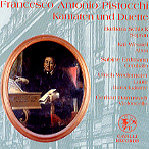A disc of duets and solo-voice cantatas by an obscure late-17th/early-18th century Italian singer/composer may not sound very enticing, but Francesco Antonio Pistocchi actually had a few good tunes in him and produced some works that at least will interest fans of vocal music of this period. It also offers a useful perspective for comparison with Pistocchi’s more esteemed contemporaries. As with many now-forgotten composers, there is documented evidence of his high regard during his lifetime, in this case by the Margrave and Electress of Brandenburg, for whom he worked as Kapellmeister at the Ansbach court. However, as much as countertenor Kai Wessel (in the liner notes) would like us to speak of Pistocchi in the same breath as Handel, it’s hard to find serious musical evidence to support this, whether in melodic inventiveness or fundamental compositional skill.
In general the best music comes in the duets, where the interactive possibilities between soprano (Barbara Schlick) and alto (Wessel) seem to have inspired Pistocchi’s better dramatic instincts and activated his more refined capacity for structural economy. The solo cantatas show a freer hand–meandering recitatives and less careful management of proportion and harmonic schemes, which results in a few illogical chord sequences and weak accompanying figures. Nevertheless, the cantata Il giglio e la viola, for soprano and basso continuo, is a gem, a well-formed work in three sections, with two beautiful arias that feature Schlick in her best voice. She’s not a very exciting singer, however, and her monochrome tone wears quickly in her other solos. Wessel comes off much better, especially in the lively aria “Fa cosi”, but for some reason the sound in his solos is distant and unflatteringly resonant. Elsewhere it’s warm and intimate and in the duets presents voices and instruments in a comfortable perspective, well-balanced and natural.
































